Ever thought about how often you use numbers in your daily life? Well, if you're traveling to Portugal soon, then you must know that learning Portuguese and how to count Portuguese numbers is a super handy skill to have.
Just imagine strolling through a bustling market in Rio, haggling over the price of a beautiful handmade bracelet. Or maybe you're trying to find your Airbnb on the 7th floor of a Lisbon apartment building. Heck, you might even be bragging about your favorite Brazilian footballer's latest hat-trick!
Guess what? In all these scenarios, you'll need numbers. And trust me, nothing beats the feeling of confidently saying "vinte e cinco reais" (25 reais) or "sétimo andar" (7th floor) like a true local.

Now, I know what you're thinking. "Oh no, not more stuff to memorize!" But here's the good news – Portuguese numbers are actually pretty friendly once you get to know them. They're like that cool cousin who's always got your back at family gatherings.
In this post, we're going to focus on the ordinal and cardinal numbers – you know, the ones you use for counting. Let's get counting! Um, dois, três... vamos nessa! (Let's do this!)

Portuguese Numbers 0-10
Let's start counting in Portuguese with the basics! Knowing the numbers from one to ten will already get you a long way.
The good news is that, like most European languages, the numbers in Portuguese follow a pattern. Moreover, they are similar to other romance languages, so it's fairly straightforward to learn them, even if you're not a fan of math!
(Pro tip: What are the romance languages? They are Italian, French, Spanish, Portuguese, and Romanian.)
Take a look at the first ten numbers in Portuguese below:
- 1 - Um/uma
- 2 - Dois/duas
- 3 - Três
- 4 - Quatro
- 5 - Cinco
- 6 - Seis
- 7 - Sete
- 8 - Oito
- 9 - Nove
- 10 - Dez
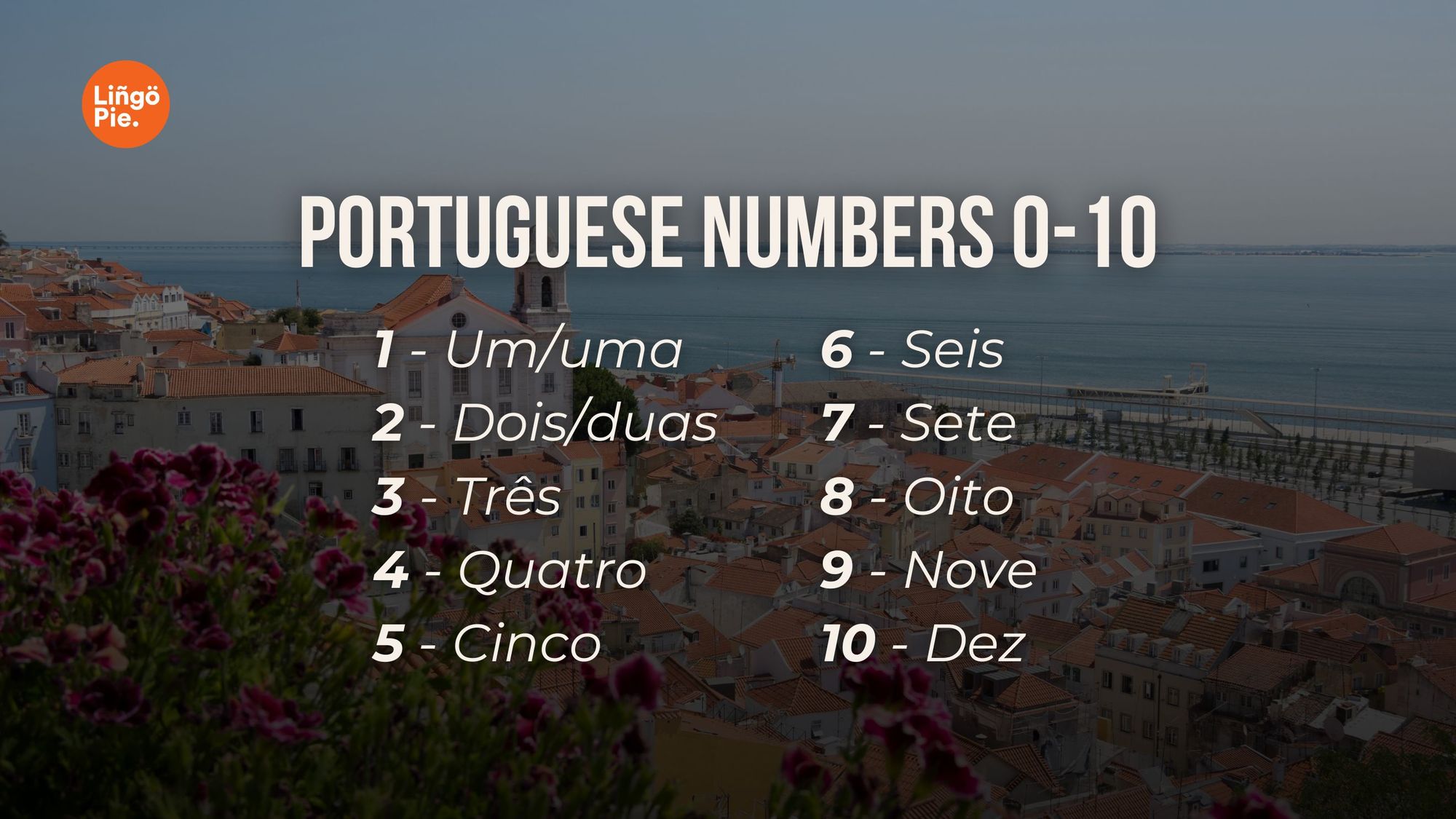
The feminine version of one is uma and the masculine version is um.
Since the Portuguese language has masculine forms and feminine forms for its nouns, you'll have to use the appropriate form depending on the gender of the noun in question.
For example, the word casa, meaning home, is a feminine word. If you were to say the words two houses you would say:
Duas casas = two houses (note that the pronunciation of the 's' in European Portuguese is more like a 'sh' sound. You won't always know this when you see Portuguese written down, so try to speak out loud when counting if you can!)
It's a good idea to learn the masculine and feminine forms at an early stage of your journey when you learn numbers in Portuguese.

Portuguese Numbers 11-19
Teen numbers in Portuguese are particularly similar to French and Spanish. Take a look at the Portuguese numbers below.
- 11 - Onze
- 12 - Doze
- 13 - Treze
- 14 - Catorze
- 15 - Quinze
- 16 - Dezesseis
- 17 - Dezessete
- 18 - Dezoito
- 19 - Dezenove
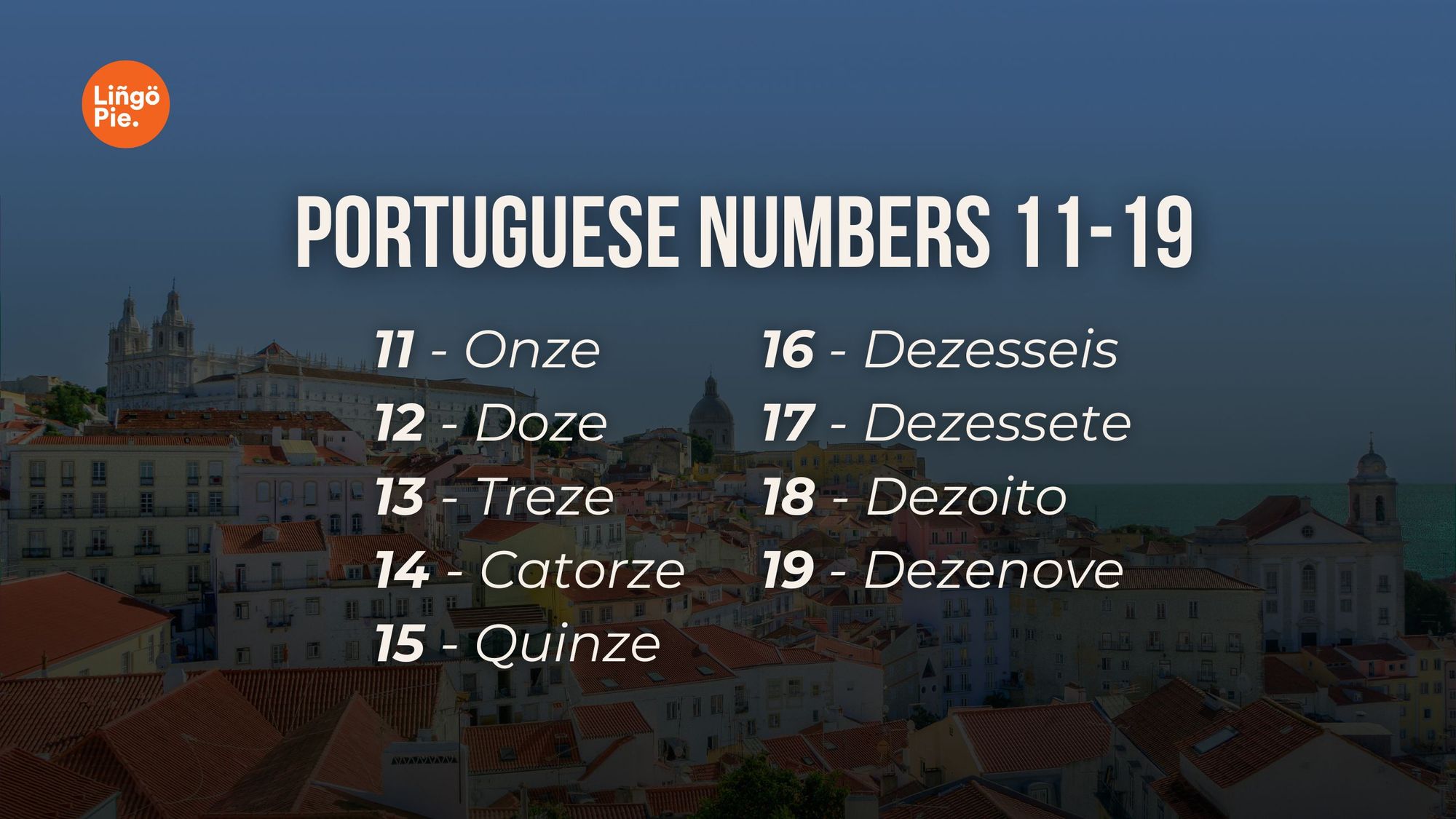
Multiples Of Ten In Portuguese
You've gotten through the worst part! Now it's time for the tens.
- 20 – vinte
- 30 – trinta
- 40 – quarenta
- 50 – cinquenta
- 60 – sessenta
- 70 – setenta
- 80 – oitenta
- 90 – noventa
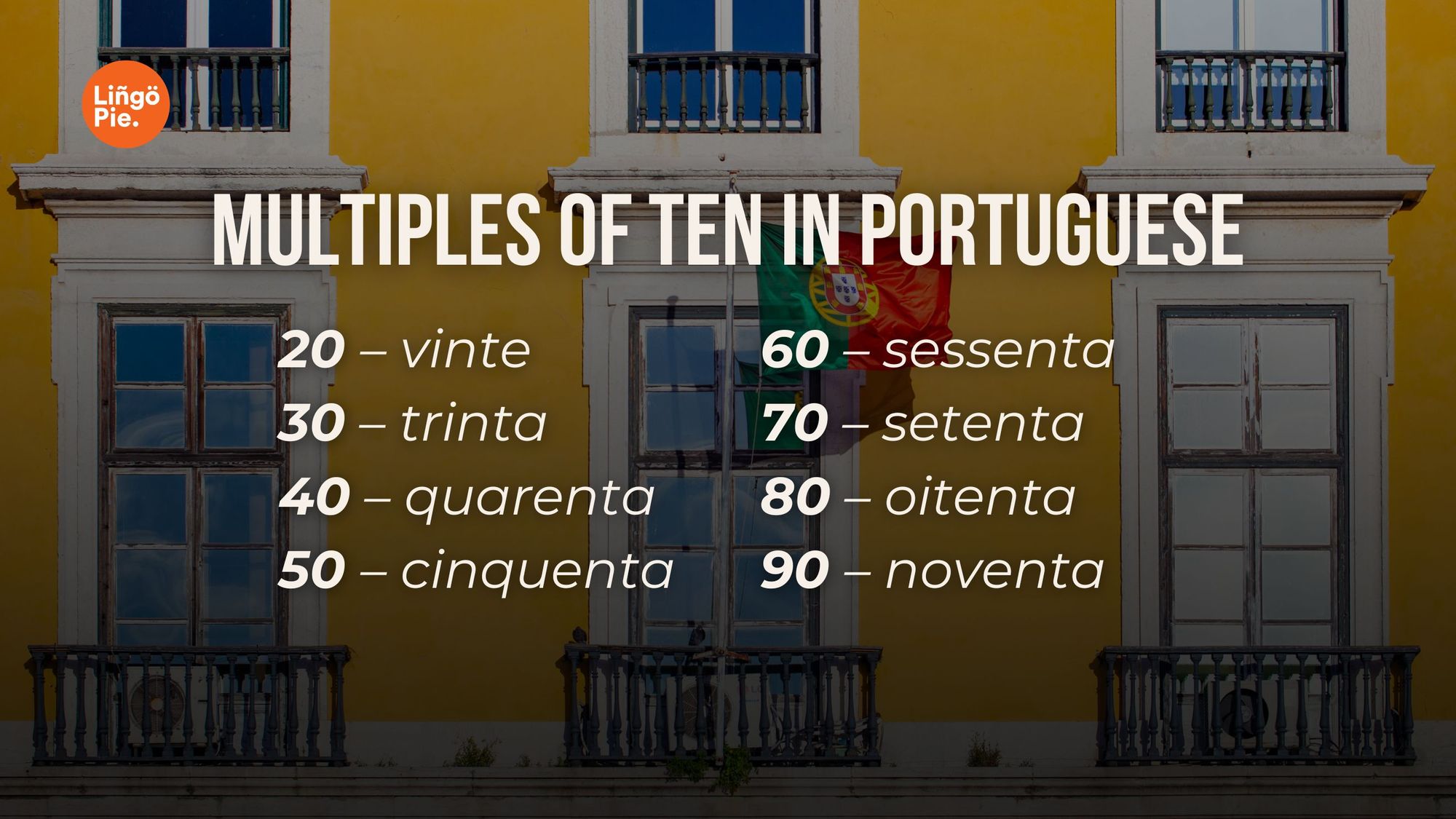
As you can see above, the tens in Portuguese are pretty easy to learn and remember, and the pronunciation isn't too tough either. Take note of the below.
That means that in most cases, a number ending in 0, will use the suffix -enta.
The numbers twenty and thirty are the only exceptions to this rule. The Portuguese word for twenty is vinte and for thirty is trinta.
Portuguese Numbers 20-100
After you reach twenty in the Portuguese language, being able to speak or write gets a lot easier! You just have to add the numbers up to ten to the multiple of ten that you need.
Notice the masculine and feminine forms of 21 and 22, as we discussed earlier? This is particularly important in spoken Portuguese.
See the numbers below:
- 20 - Vinte
- 21 - Vinte e um / uma
- 22 - Vinte e dois / duas
- 23 - Vinte e três
- 24 - Vinte e quatro
- 25 - Vinte e cinco
- 26 - Vinte e seis
- 27 - Vinte e sete
- 28 - Vinte e oito
- 29 - Vinte e nove
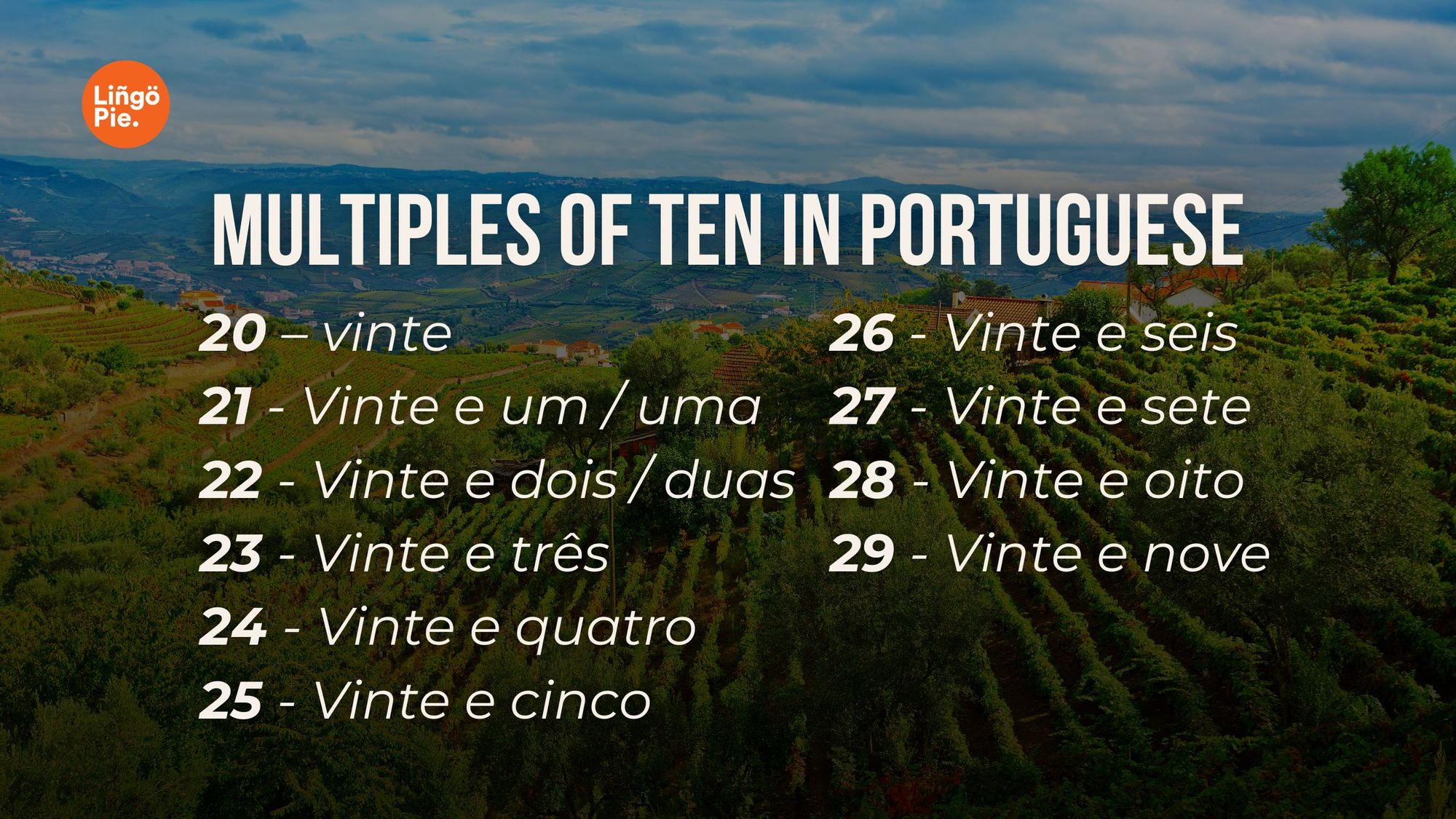
After 30, you'll notice that the pattern stays the same. The numbers are as follows:
- 30 - Trinta
- 31 - Trinta e um
- 32 - Trinta e dois
- 33 - Trinta e três
- 34 - Trinta e quatro
- 35 - Trinta e cinco
- 36 - Trinta e seis
- 37 - Trinta e sete
- 38 - Trinta e oito
- 39 - Trinta e nove
- 40 - Quarenta
- 41 - Quarenta e um
- 42 - Quarenta e dois
- 43 - Quarenta e três
- 44 - Quarenta e quatro
- 45 - Quarenta e cinco
- 46 - Quarenta e seis
- 47 - Quarenta e sete
- 48 - Quarenta e oito
- 49 - Quarenta e nove
- 50 - Cinquenta
- 51 - Cinquenta e um
- 52 - Cinquenta e dois
- 53 - Cinquenta e três
- 54 - Cinquenta e quatro
- 55 - Cinquenta e cinco
- 56 - Cinqueta e seis
- 57 - Cinquenta e sete
- 58 - Cinquenta e oito
- 59 - Cinquenta e nove
- 60 - Sessenta
- 61 - Sessenta e um
- 62 - Sessenta e dois
- 63 - Sessenta e três
- 64 - Sessenta e quatro
- 65 - Sessenta e cinco
- 66 - Sessenta e seis
- 67 - Sessenta e sete
- 68 - Sessenta e oito
- 69 - Sessenta e nove
- 70 - Setenta
- 71 - Setenta e um
- 72 - Setenta e dois
- 73 - Setenta e três
- 74 - Setenta e quatro
- 75 - Setenta e cinco
- 76 - Setenta e seis
- 77 - Setenta e sete
- 78 - Setenta e oito
- 79 - Setenta e nove
- 80 - Oitenta
- 81 - Oitenta e um
- 82 - Oitenta e dois
- 83 - Oitenta e três
- 84 - Oitenta e quatro
- 85 - Oitenta e cinco
- 86 - Oitenta e seis
- 87 - Oitenta e sete
- 88 - Oitenta e oito
- 89 - Oitenta e nove
- 90 - Noventa
- 91 - Noventa e um
- 92 - Noventa e dois
- 93 - Noventa e três
- 94 - Noventa e quatro
- 95 - Noventa e cinco
- 96 - Noventa e seis
- 97 - Noventa e sete
- 98 - Noventa e oito
- 99 - Noventa e nove
- 100 - Cem
“Cem” vs “Cento” in Portuguese Numbers
Bom, you've now learned how to say all the numbers up to one hundred! To continue past one hundred, you'll just have to bear in mind that cem becomes cento. Then, you can add whatever number you need after that.
Let's look at the examples below.
- Cento e um
- Cento e dois
- Cento e três
- Cento e quatro
- Cento e cinco
- Cento e seis
- Cento e sete
- Cento e oito
- Cento e nove
- Cento e dez
Numbers up to 1,000 In Portuguese
If you've gotten this far, the next steps will be fairly easy.
To continue up to 1,000 (or mil), you'll need the pre-fix and suffix for the hundreds. Take a look at the example below.
- 100 - Cem / cento
- 200 - Duzentos
- 300 - Trezentos
- 400 - Quatrocentos
- 500 - Quinhentos
- 600 - Seiscentos
- 700 - Setecentos
- 800 - Oitocentos
- 900 - Novecentos
- 1,000 - Mil
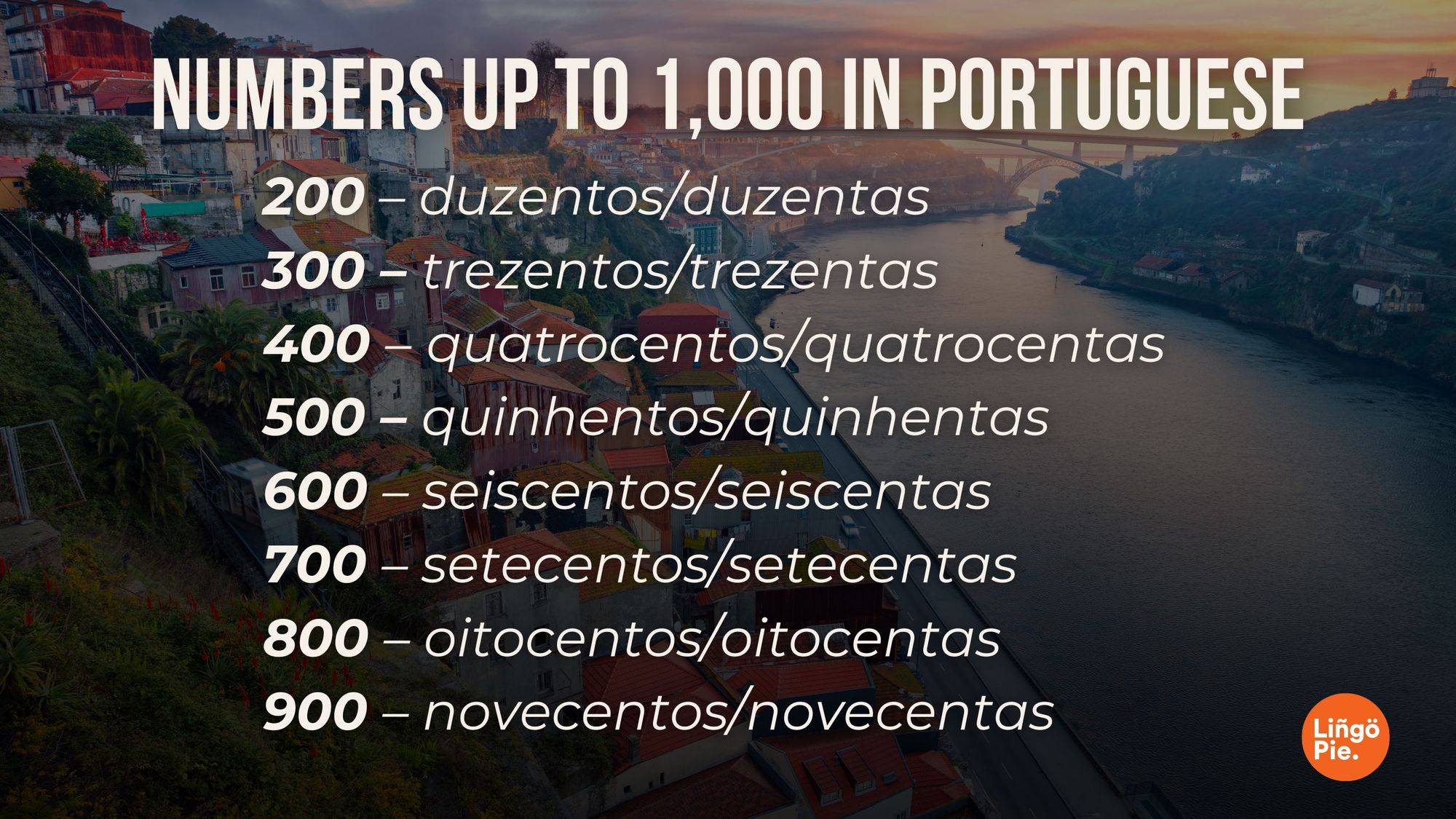
Numbers above 1,000 in Portuguese
Alright, now we're hitting the big numbers! Let's dive in.
The logic is exactly the same. You'll use mil, which means one thousand, and then you'll add the following numbers.
Check out the example below, mixing the numbers you've learned already!
- 1,200 - mil e duzentos
- 1,250 - mil duzentos e cinquenta
- 1,253 - mil duzentos e cinquenta e três
After 2,000, you just have to add the number before mil.
For example:
- 2,000 - dois mil
- 3,000 - três mil
And so on...
- 2,498 - dois mil quatrocentos e noventa e oito
Simple, right?
Millions and Billions (Long vs Short scale numbers) in Portuguese
Other numbers that you might want to know about are:
- ENG: One million / millions
- POR: Um milhão / milhões
- One billion / billions (in American English)
- One thousand million (in other English speaking countries)
This form actually differs between European Portuguese and Brazilian Portuguese:
- Um bilião / biliões - European Portuguese
- Um bilhão / bilhões - Brazilian Portuguese
Ordinal Numbers In Portuguese
Ever wanted to impress your Portuguese friends by perfectly describing your race position or the floor of your apartment? Ordinal numbers are your secret weapon! Let's dive in:
First, the basics (1st to 10th):
- 1st – primeiro
- 2nd – segundo
- 3rd – terceiro
- 4th – quarto
- 5th – quinto
- 6th – sexto
- 7th – sétimo
- 8th – oitavo
- 9th – nono
- 10th – décimo
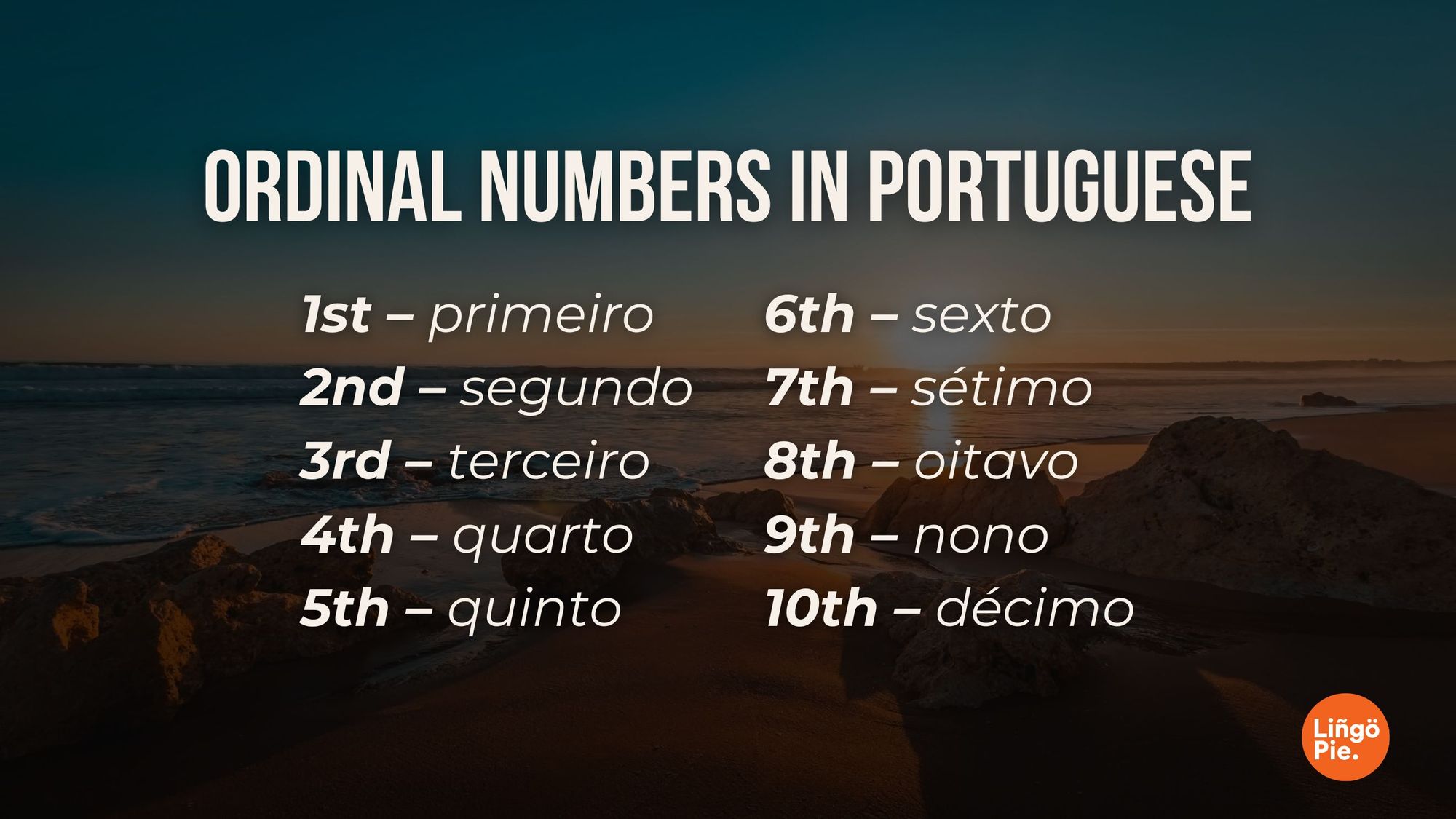
Memorize these 10, and you're halfway to ordinal number mastery! Now, let's conquer the tens (porque não?):
- 20th – vigésimo
- 30th – trigésimo
- 40th – quadragésimo
- 50th – quinquagésimo
- 60th – sexagésimo
- 70th – septuagésimo
- 80th – octogésimo
- 90th – nonagésimo
- 100th – centésimo
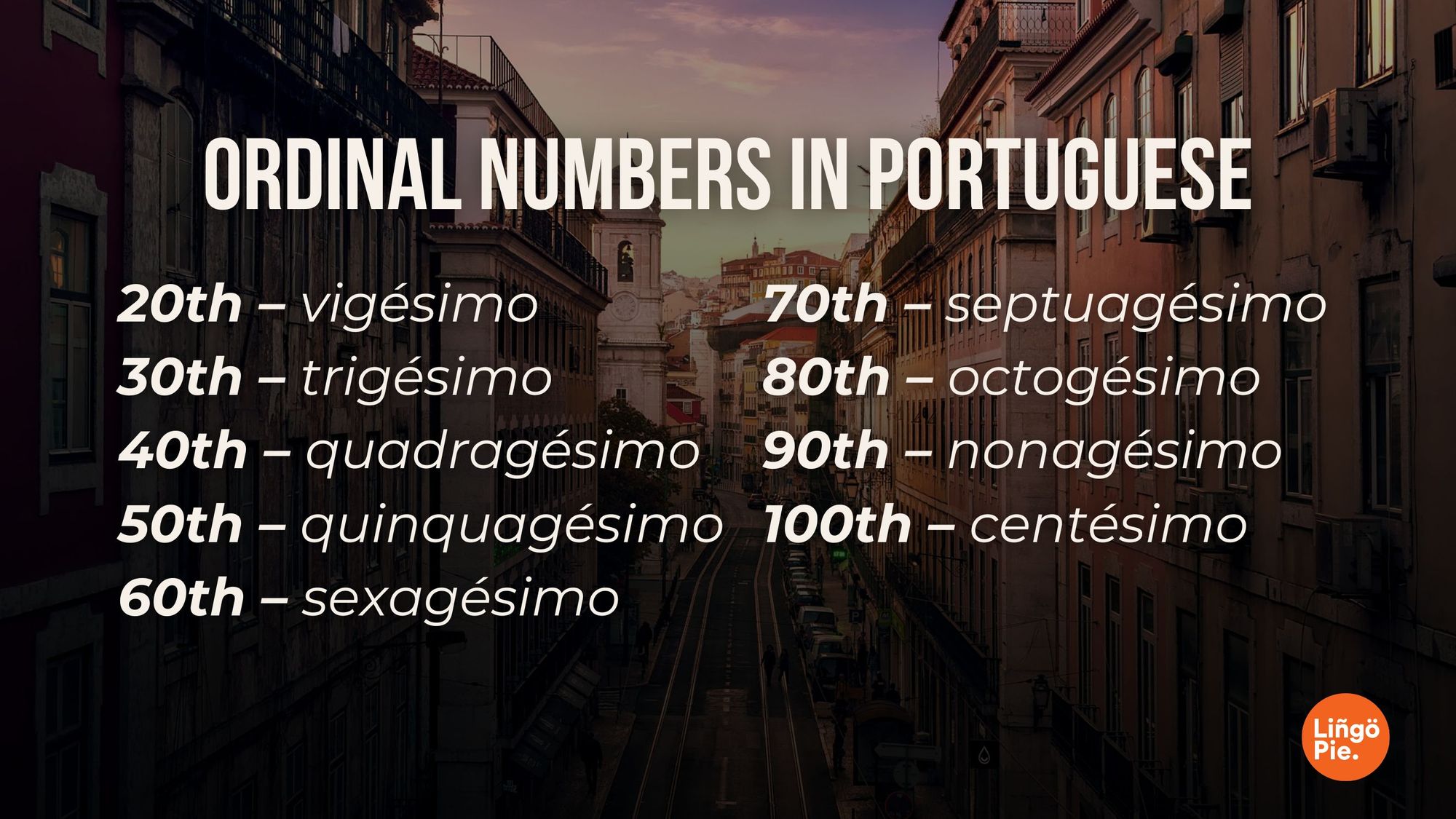
Other important information relating to Portuguese numbers
Let's look at other important information you should learn in order to familiarize yourself with Portuguese numbers.
We're about to cover the following:
Decimal points and commas
Prices and costs
Phone numbers
Using numbers when shopping
Decimal points and commas in Portuguese numbers
In Portuguese, you'll need to use a comma instead of a decimal point, as in the example below:
It's €22,5 as opposed to €22.50 and you write it in the following way:
Vinte e dois euros e cinquenta cêntimos.
Saying Prices in Portuguese
Here are a few sentences that will be useful when purchasing something in Portugal or Brazil:
- Quanto custa? How much does it cost?
- É um euro e vinte cêntimos. It's one euro and twenty cents.
- Custa trinta e cinco euros. It costs thirty-five euros.
- São vinte e um reais. It's twenty-one reais.
Brazilian Portuguese vs European Portuguese: Are the numbers different?
Linguistically, there are many differences between European Portuguese and Brazilian Portuguese, both in terms of vocabulary, some grammar and, of course, prounciation.
When it comes to Portuguese numbers, the only significant difference is the number six.
Giving your phone number in Portuguese
Alright, so maybe you've moved to Portugal and you need to set up a bank account, or you're on vacation in Brazil and are making a dinner reservation...
Either way, there will come a time when you'll need to give out your phone number, certo?
In both Portugal and Brazil, you would say:
- Qual é o teu/seu número de telefone? What's your phone number?
- O meu número é 96 451 56 33. My number is 96 451 56 33.
Using numbers in Portuguese when shopping
While shopping, you'll need to know the numbers to pay for your bill and to describe quantities.
Since we've looked at prices already, let's look at another two words that can be helpful when you go shopping.
Look at the following examples:
- Meia dúzia de bananas = half a dozen bananas
- Uma dúzia de laranjas = a dozen oranges
If you find these words and phrases useful, check out these Portuguese phrases for travel.
Summing up: Numbers in Portuguese
You may still have noventa e nove (ninety-nine) problems, but counting in Portuguese is no longer one of them (we hope!)
Whether you're seduced by the appealing tropical sceneries of Brazil or the laidback beach culture in Portugal, know that counting will come in handy.
Now that you've learned the cardinal numbers in Portuguese, you're all set to move to or travel to a Portuguese-speaking country. If you'd like another challenge, learn the ordinal numbers next!
And, for a creative way to learn the Portuguese language, why not check out Lingopie? On Lingopie, you'll find video lessons and other material to learn a variety of different languages. Boa sorte!


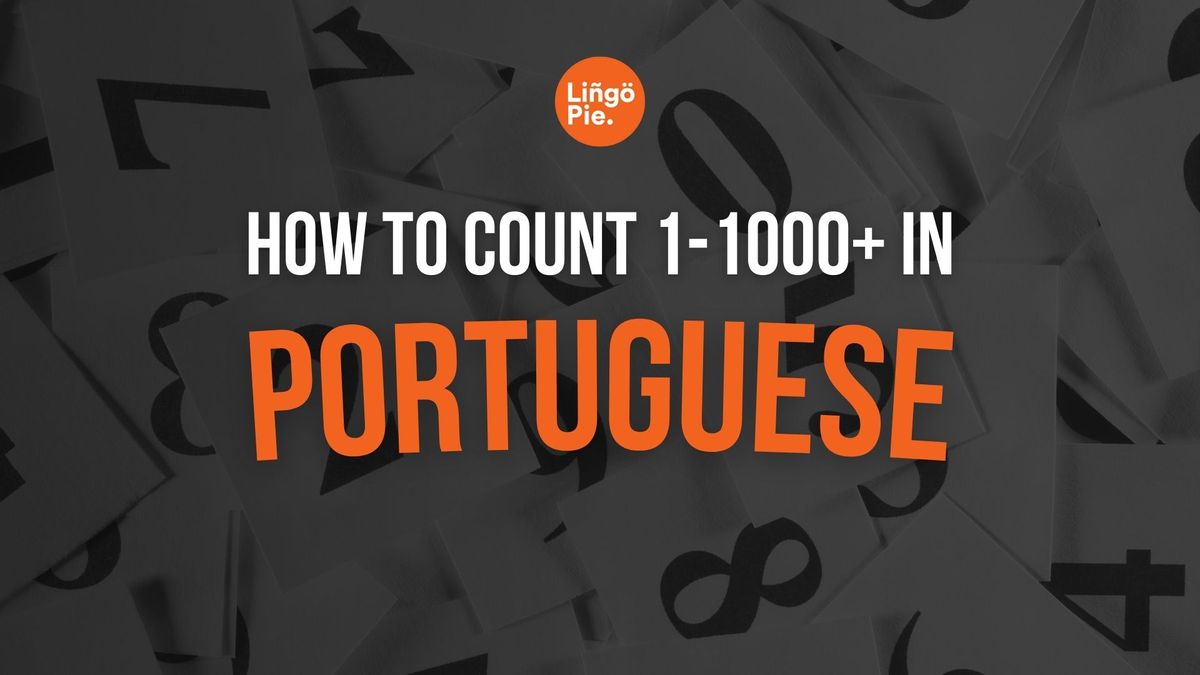






![How To Learn Portuguese Fast? [Best 2025 Guide]](/blog/content/images/size/w300/2024/08/Lingopie-2.png)
